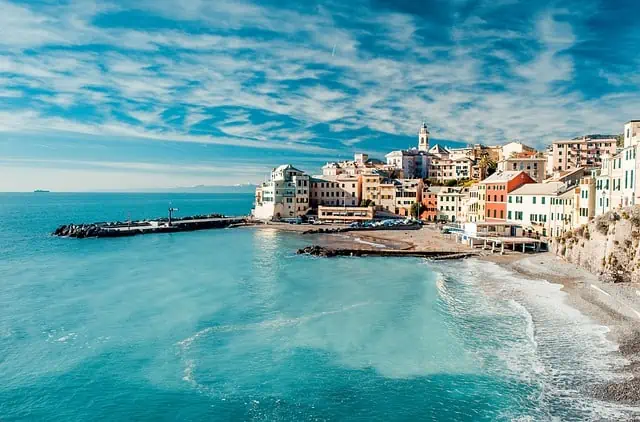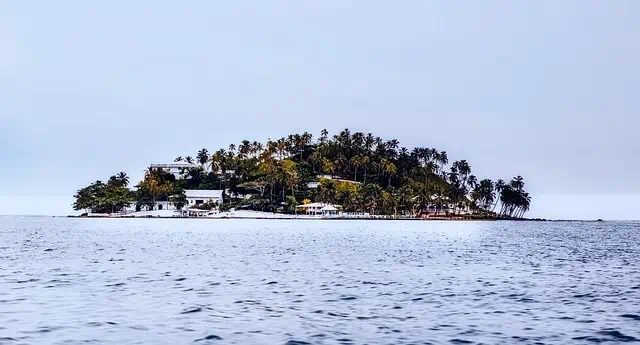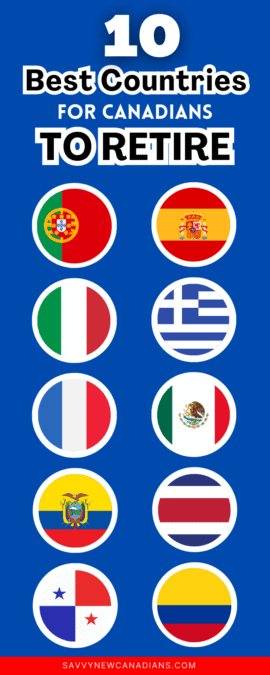Have you always dreamed of escaping Canada’s harsh winters and retiring to an affordable tropical destination?
If you plan to retire overseas as an expat, it is best to begin the process by planning. One of the first things you must determine is what country to retire to.
Key Takeaways
- The best places to retire in Europe include Portugal, Spain, France, Italy and Greece.
- The best countries to retire on a budget are Mexico, Panama, Ecuador, Costa Rica and Colombia.
- When looking for the best retirement location, consider factors like climate and weather, cost of living, safety and crime rates, and healthcare expenses.
Best Places to Retire in Europe
The European continent has several retirement destinations that Canadians will find ideal. Below are five of the best places to retire in Europe, the cost of living and some of the popular things to do in these countries.
1. Portugal

Portugal is one of the most popular retirement places for Canadian expats. With its Mediterranean climate, it is a welcome change for individuals used to Canada’s freezing winters.
The cost of living in Portugal is also more affordable than in Canada. A cost of living comparison between Portugal and Canada shows that consumer prices (including rent) are 42.1% higher than in Portugal. Rent prices in Canada are 38.2% higher than in Portugal.
For retirees, Portugal offers various things to do, such as park visits, day trips, walking and bus tours, wine tastings, river cruises, sailing, whale watching and photography,
2. Spain

Spain is another excellent option for Canadian retirees looking for a laid-back way of life in a country with warm summers and mild winters, similar to Portugal’s climate.
Comparing the cost of living between Spain and Canada shows that consumer prices, including rent, in Canada are 41.7% higher than in Spain. Rent prices are also higher in Canada by 50%.
The things retirees can do in Spain are aplenty. These include visiting Spanish wineries and art galleries, taking tours and road trips, hiking and surfing.
3. France

France offers an excellent quality of life along with modern comforts, a mostly temperate climate, and a slower pace of life that many Canadian retirees would want to experience in their retirement years.
While there is an impression that France is an expensive country to live in, a cost of living comparison between Canada and France shows that consumer prices, including rent, in some areas are 12.1% lower than in Canada. Likewise, rent prices in France are 36.9% lower.
Retirees have countless things to do in France, from experiencing gourmet cuisine, taking tours, visiting historic sites, horse riding, exploring beaches, surfing and canoeing.
4. Italy

Italy is one of Europe’s most renowned vacation spots and a great alternative for those who want to retire abroad. Its delicious food, fabulous destinations, magnificent towns and warm weather make it an ideal retirement destination.
In terms of the cost of living between Canada and Italy, consumer prices, including rent, in Italy are 22% lower than in Canada, and rent prices in Italy are 41.3% lower as well.
Some of the best things to do in Italy are hiking, riding Venetian gondolas, touring hilly countrysides, watching operas, attending local festivals, skiing and trekking.
5. Greece

With its warm Mediterranean weather, Greece is another refreshing change from the harsh Canadian climate. It has spectacular islands and some of the most beautiful beaches in the world.
It also offers a reasonable cost of living. Consumer prices, including rent, in Canada are 49.5% higher than in Greece, while rent prices in Canada are 161.2% higher.
Retirees who plan to retire in Greece have various things to do, such as visiting parks and museums, playing tennis or volleyball, hiking, sailing, river trekking and island-hopping.
Best Countries to Retire on a Budget
If you wish to retire abroad but are concerned about the costs, find below five of the best countries to retire on a budget, where you can stretch your dollar a lot further.
6. Mexico

Mexico has been an expat favourite for years due to various benefits such as affordable health care and a robust infrastructure.
Between the two countries, consumer prices, including rent, in Canada are 75.4% higher than in Mexico. Rent prices in Canada are likewise higher by 133.2%.
Mexico offers a lot of things to do for retirees. These include swimming, horseback riding, visiting an underwater museum, going on boat tours, exploring towns and visiting archaeological sites.
7. Panama

Canadians who prefer to avoid frigid and windy winters would love Panama as an ideal retirement location, with its warm climate, excellent healthcare and favourable taxes.
As for living costs, Panama is more affordable than Canada. Consumer prices, including rent, in Panama are 29.7% lower than in Canada, while rent prices in Panama are 34.9% lower than in Canada.
Panama is famous for various things, such as the Panama Canal, San Blas islands and geisha coffee. The things to do include visiting churches and markets, taking an eco-adventure, trekking and touring landscapes.
8. Ecuador

Canadians looking to retire comfortably may find Ecuador an attractive option due to its low living costs and pleasant climate, similar to having spring throughout the year.
The cost of living in Ecuador is significantly lower than in Canada. Consumer prices with rent in Canada are 122.9% higher than in Ecuador. The rent prices are also higher in Canada, specifically by 252.3%.
Among the many things retirees can do in Ecuador are countryside horse riding, hiking, touring World Heritage sites and colonial churches, visiting parks and old towns and whale watching.
9. Costa Rica

Costa Rica offers a laid-back lifestyle, excellent health care system, accessibility, affordable cost of living and a better quality of life at a lower cost in tropical surroundings.
When it comes to the cost of living, Costa Rica is considerably more affordable. Consumer prices, including rent, in Canada are 42.2% higher than in Costa Rica. Rent prices in Canada are also higher by 109.2%.
Retirees can enjoy a range of activities, from rainforest night walks to jungle night tours, volcano hikes, wildlife tours, guided tours, birdwatching, chartered cruises, and lounging on stunning beaches.
10. Colombia

Colombia is also an outstanding option for retirees looking for an affordable way of life. While it is the rainiest country on earth, Colombia is a generally warm, tropical place.
As for the cost of living, consumer prices, including rent, in Canada are 165.1% higher than in Colombia, while rent prices in Canada are 296.0% higher than in Colombia.
Some of the best things to do in Colombia are animal watching, horseback riding, kitesurfing, hiking, snorkelling, diving, joining group tours, renting a private boat, and going on nature excursions.
How to Choose the Best Place to Retire as a Canadian
As a Canadian, planning is crucial before retiring to another country. One of the first steps is to choose where to retire. With the many options, it would help to have guidelines that will help to determine the best place to retire to.
Below are tips on picking the best retirement location for you.
- Climate and weather. If you are close to retiring, you would want to move somewhere where the climate is not severe, and the weather is permanently comfortable, allowing for outdoor activities year-round.
- Cost of living. Local living costs are critical as they dictate the kind of lifestyle you can afford during retirement. Evaluate the relative cost of living by taking into account costs like housing, transportation, utilities, groceries and healthcare.
- Safety and crime rates. As you grow older, safety becomes a high priority. Check the crime statistics of your potential retirement location, including property and violent crimes.
- Health care expenses. Healthcare costs vary greatly between countries. Compare locations, long-term costs and availability of treatments for specialized conditions in the places you are considering as retirement locations.

FAQs
Spain, Thailand and Panama are the easiest countries for Canadians to retire to. They have significant expat populations, superior medical care, infrastructure similar to what Canadians are used to, and many English-speaking inhabitants.
Portugal is one of the cheapest retirement places for Canadians. The cost of living in this country is generally lower than in many other countries, Canada included. Numbeo figures show that the cost of living in Porto, Portugal is 40.9% lower than in Toronto.
A Canadian pensioner can stay outside the country for about 180 days per year without losing benefits. Pension payments stop if you are out of the country for more than six months after the month of your departure.
Canadian citizens who plan to live permanently abroad can opt for permanent residency or citizenship in their host country without losing their status. Persons born in Canada do not lose their citizenship on the basis that they are not or have not been living in the country.
Related:




March 15
I have a question:
I am an 82-year-old Canadian citizen with limited income. I receive CPP, OAS, and GIS, totaling about $2700 monthly.
Is there likely an increase in OAS and CPP this month, as is being discussed in many places on YouTube?
Second, what income ( besides RIFF, CPP, OAS) determines the amount of GIS? Which column on the income tax 2023 is this indicated on? Please help since it is unclear whether my GIS will continue or not.
Thank you very much.
@Kumar: The next increase will likely occur next quarter i.e. April-June payment cycle.
Your overall income determines whether you qualify for GIS or not, which I assume will mainly be the income sources you have mentioned.